Integrated Nursing Care of the Adult Patient: A Report Analysis
VerifiedAdded on 2023/06/10
|8
|2428
|122
Report
AI Summary
This report provides an in-depth analysis of integrated nursing care for adult patients, emphasizing a patient-centric approach. It explores the importance of effective communication between nurses and patients, highlighting strategies such as building interpersonal relationships, providing patient education, and addressing potential barriers like language and cultural differences. The report examines the psychological responses of patients, particularly in cases like the assumed case study of Onyeka, a 27-year-old single mother with sepsis, UTIs, and type 1 diabetes, and discusses stress management techniques. Furthermore, it details the crucial role of nurses in providing comprehensive care, including interventions to reduce patient stress, administering appropriate medications, and acting as a liaison between doctors and pharmacy services. The report concludes by underscoring the benefits of meditation and other strategies in improving patient health outcomes.
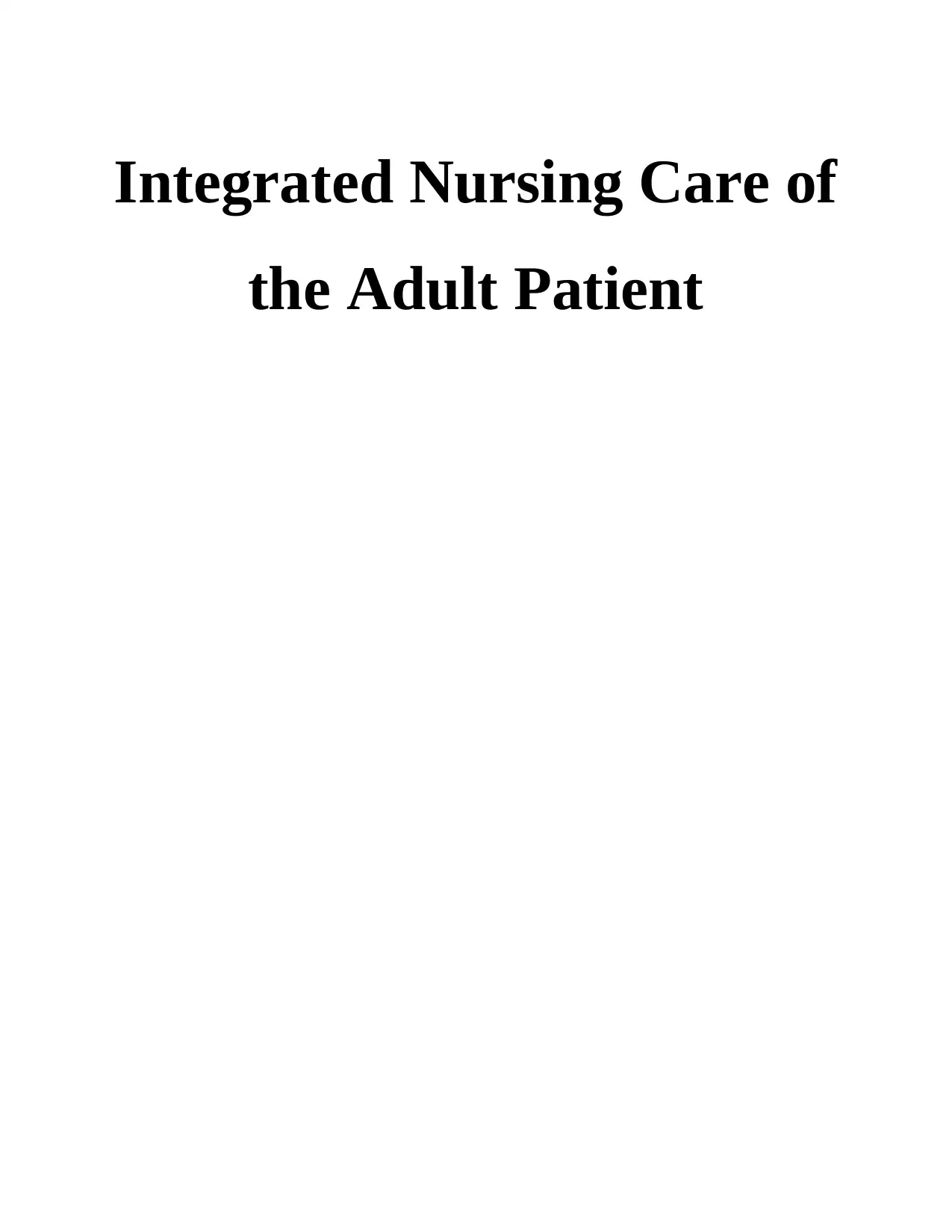
Integrated Nursing Care of
the Adult Patient
the Adult Patient
Paraphrase This Document
Need a fresh take? Get an instant paraphrase of this document with our AI Paraphraser
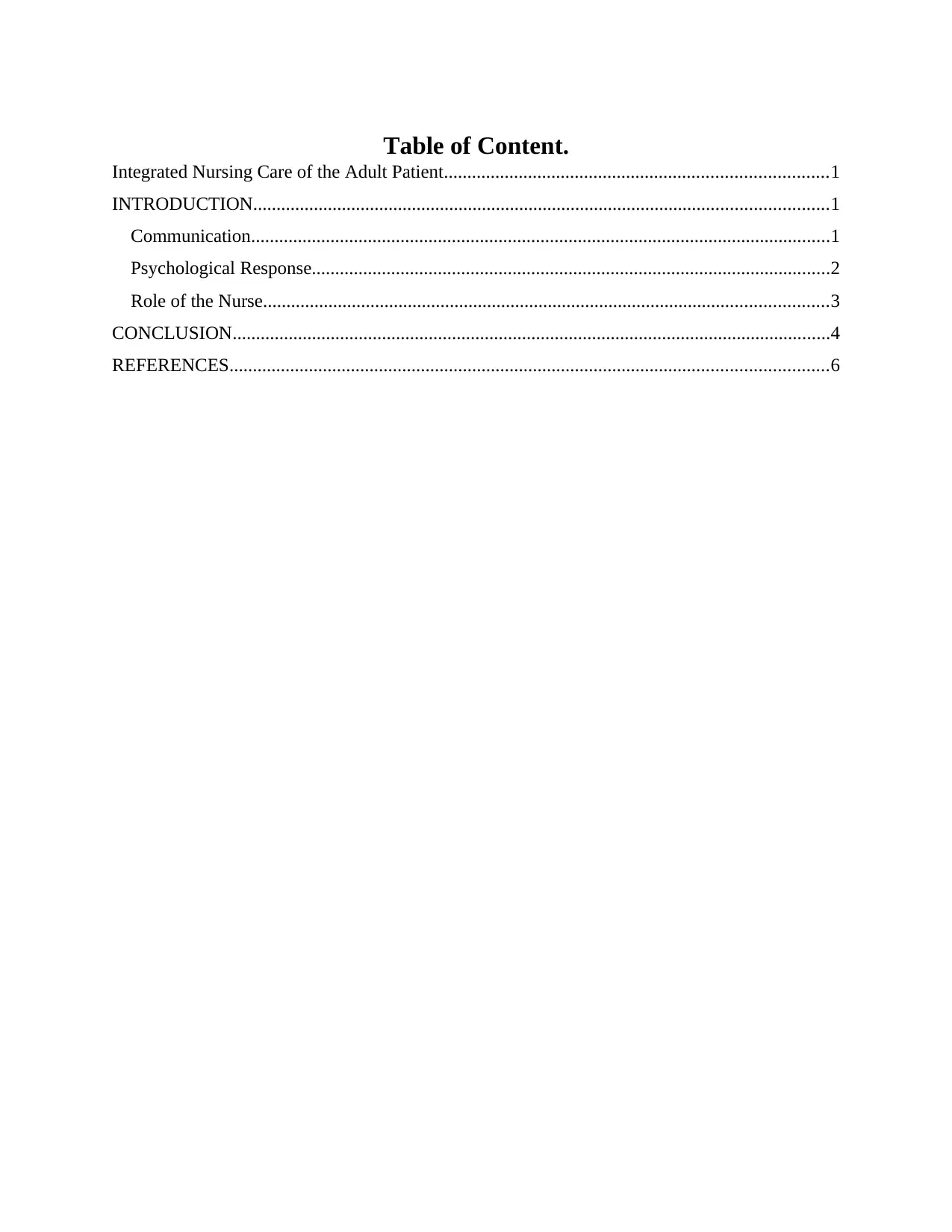
Table of Content.
Integrated Nursing Care of the Adult Patient..................................................................................1
INTRODUCTION...........................................................................................................................1
Communication............................................................................................................................1
Psychological Response...............................................................................................................2
Role of the Nurse.........................................................................................................................3
CONCLUSION................................................................................................................................4
REFERENCES................................................................................................................................6
Integrated Nursing Care of the Adult Patient..................................................................................1
INTRODUCTION...........................................................................................................................1
Communication............................................................................................................................1
Psychological Response...............................................................................................................2
Role of the Nurse.........................................................................................................................3
CONCLUSION................................................................................................................................4
REFERENCES................................................................................................................................6
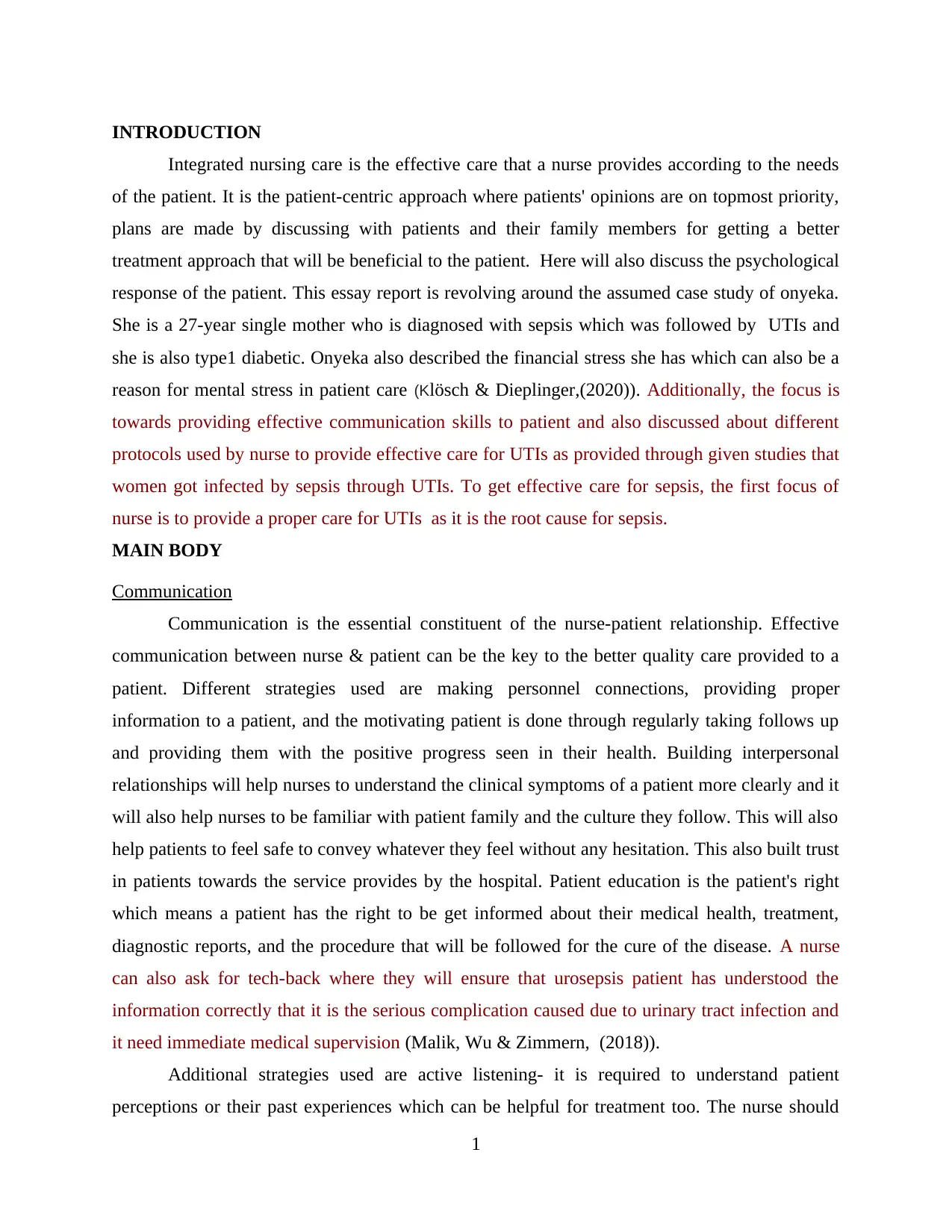
INTRODUCTION
Integrated nursing care is the effective care that a nurse provides according to the needs
of the patient. It is the patient-centric approach where patients' opinions are on topmost priority,
plans are made by discussing with patients and their family members for getting a better
treatment approach that will be beneficial to the patient. Here will also discuss the psychological
response of the patient. This essay report is revolving around the assumed case study of onyeka.
She is a 27-year single mother who is diagnosed with sepsis which was followed by UTIs and
she is also type1 diabetic. Onyeka also described the financial stress she has which can also be a
reason for mental stress in patient care (Klösch & Dieplinger,(2020)). Additionally, the focus is
towards providing effective communication skills to patient and also discussed about different
protocols used by nurse to provide effective care for UTIs as provided through given studies that
women got infected by sepsis through UTIs. To get effective care for sepsis, the first focus of
nurse is to provide a proper care for UTIs as it is the root cause for sepsis.
MAIN BODY
Communication
Communication is the essential constituent of the nurse-patient relationship. Effective
communication between nurse & patient can be the key to the better quality care provided to a
patient. Different strategies used are making personnel connections, providing proper
information to a patient, and the motivating patient is done through regularly taking follows up
and providing them with the positive progress seen in their health. Building interpersonal
relationships will help nurses to understand the clinical symptoms of a patient more clearly and it
will also help nurses to be familiar with patient family and the culture they follow. This will also
help patients to feel safe to convey whatever they feel without any hesitation. This also built trust
in patients towards the service provides by the hospital. Patient education is the patient's right
which means a patient has the right to be get informed about their medical health, treatment,
diagnostic reports, and the procedure that will be followed for the cure of the disease. A nurse
can also ask for tech-back where they will ensure that urosepsis patient has understood the
information correctly that it is the serious complication caused due to urinary tract infection and
it need immediate medical supervision (Malik, Wu & Zimmern, (2018)).
Additional strategies used are active listening- it is required to understand patient
perceptions or their past experiences which can be helpful for treatment too. The nurse should
1
Integrated nursing care is the effective care that a nurse provides according to the needs
of the patient. It is the patient-centric approach where patients' opinions are on topmost priority,
plans are made by discussing with patients and their family members for getting a better
treatment approach that will be beneficial to the patient. Here will also discuss the psychological
response of the patient. This essay report is revolving around the assumed case study of onyeka.
She is a 27-year single mother who is diagnosed with sepsis which was followed by UTIs and
she is also type1 diabetic. Onyeka also described the financial stress she has which can also be a
reason for mental stress in patient care (Klösch & Dieplinger,(2020)). Additionally, the focus is
towards providing effective communication skills to patient and also discussed about different
protocols used by nurse to provide effective care for UTIs as provided through given studies that
women got infected by sepsis through UTIs. To get effective care for sepsis, the first focus of
nurse is to provide a proper care for UTIs as it is the root cause for sepsis.
MAIN BODY
Communication
Communication is the essential constituent of the nurse-patient relationship. Effective
communication between nurse & patient can be the key to the better quality care provided to a
patient. Different strategies used are making personnel connections, providing proper
information to a patient, and the motivating patient is done through regularly taking follows up
and providing them with the positive progress seen in their health. Building interpersonal
relationships will help nurses to understand the clinical symptoms of a patient more clearly and it
will also help nurses to be familiar with patient family and the culture they follow. This will also
help patients to feel safe to convey whatever they feel without any hesitation. This also built trust
in patients towards the service provides by the hospital. Patient education is the patient's right
which means a patient has the right to be get informed about their medical health, treatment,
diagnostic reports, and the procedure that will be followed for the cure of the disease. A nurse
can also ask for tech-back where they will ensure that urosepsis patient has understood the
information correctly that it is the serious complication caused due to urinary tract infection and
it need immediate medical supervision (Malik, Wu & Zimmern, (2018)).
Additional strategies used are active listening- it is required to understand patient
perceptions or their past experiences which can be helpful for treatment too. The nurse should
1
⊘ This is a preview!⊘
Do you want full access?
Subscribe today to unlock all pages.

Trusted by 1+ million students worldwide
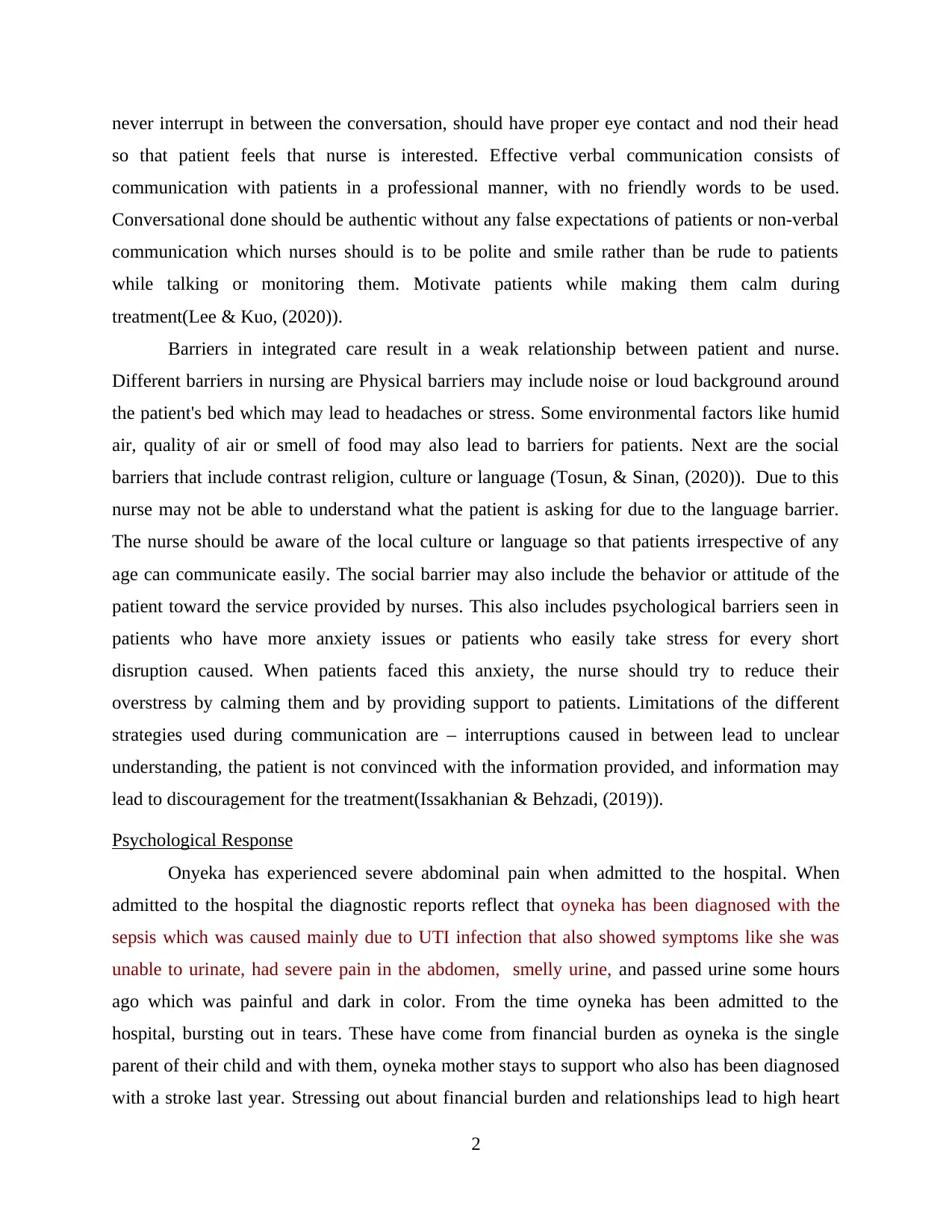
never interrupt in between the conversation, should have proper eye contact and nod their head
so that patient feels that nurse is interested. Effective verbal communication consists of
communication with patients in a professional manner, with no friendly words to be used.
Conversational done should be authentic without any false expectations of patients or non-verbal
communication which nurses should is to be polite and smile rather than be rude to patients
while talking or monitoring them. Motivate patients while making them calm during
treatment(Lee & Kuo, (2020)).
Barriers in integrated care result in a weak relationship between patient and nurse.
Different barriers in nursing are Physical barriers may include noise or loud background around
the patient's bed which may lead to headaches or stress. Some environmental factors like humid
air, quality of air or smell of food may also lead to barriers for patients. Next are the social
barriers that include contrast religion, culture or language (Tosun, & Sinan, (2020)). Due to this
nurse may not be able to understand what the patient is asking for due to the language barrier.
The nurse should be aware of the local culture or language so that patients irrespective of any
age can communicate easily. The social barrier may also include the behavior or attitude of the
patient toward the service provided by nurses. This also includes psychological barriers seen in
patients who have more anxiety issues or patients who easily take stress for every short
disruption caused. When patients faced this anxiety, the nurse should try to reduce their
overstress by calming them and by providing support to patients. Limitations of the different
strategies used during communication are – interruptions caused in between lead to unclear
understanding, the patient is not convinced with the information provided, and information may
lead to discouragement for the treatment(Issakhanian & Behzadi, (2019)).
Psychological Response
Onyeka has experienced severe abdominal pain when admitted to the hospital. When
admitted to the hospital the diagnostic reports reflect that oyneka has been diagnosed with the
sepsis which was caused mainly due to UTI infection that also showed symptoms like she was
unable to urinate, had severe pain in the abdomen, smelly urine, and passed urine some hours
ago which was painful and dark in color. From the time oyneka has been admitted to the
hospital, bursting out in tears. These have come from financial burden as oyneka is the single
parent of their child and with them, oyneka mother stays to support who also has been diagnosed
with a stroke last year. Stressing out about financial burden and relationships lead to high heart
2
so that patient feels that nurse is interested. Effective verbal communication consists of
communication with patients in a professional manner, with no friendly words to be used.
Conversational done should be authentic without any false expectations of patients or non-verbal
communication which nurses should is to be polite and smile rather than be rude to patients
while talking or monitoring them. Motivate patients while making them calm during
treatment(Lee & Kuo, (2020)).
Barriers in integrated care result in a weak relationship between patient and nurse.
Different barriers in nursing are Physical barriers may include noise or loud background around
the patient's bed which may lead to headaches or stress. Some environmental factors like humid
air, quality of air or smell of food may also lead to barriers for patients. Next are the social
barriers that include contrast religion, culture or language (Tosun, & Sinan, (2020)). Due to this
nurse may not be able to understand what the patient is asking for due to the language barrier.
The nurse should be aware of the local culture or language so that patients irrespective of any
age can communicate easily. The social barrier may also include the behavior or attitude of the
patient toward the service provided by nurses. This also includes psychological barriers seen in
patients who have more anxiety issues or patients who easily take stress for every short
disruption caused. When patients faced this anxiety, the nurse should try to reduce their
overstress by calming them and by providing support to patients. Limitations of the different
strategies used during communication are – interruptions caused in between lead to unclear
understanding, the patient is not convinced with the information provided, and information may
lead to discouragement for the treatment(Issakhanian & Behzadi, (2019)).
Psychological Response
Onyeka has experienced severe abdominal pain when admitted to the hospital. When
admitted to the hospital the diagnostic reports reflect that oyneka has been diagnosed with the
sepsis which was caused mainly due to UTI infection that also showed symptoms like she was
unable to urinate, had severe pain in the abdomen, smelly urine, and passed urine some hours
ago which was painful and dark in color. From the time oyneka has been admitted to the
hospital, bursting out in tears. These have come from financial burden as oyneka is the single
parent of their child and with them, oyneka mother stays to support who also has been diagnosed
with a stroke last year. Stressing out about financial burden and relationships lead to high heart
2
Paraphrase This Document
Need a fresh take? Get an instant paraphrase of this document with our AI Paraphraser
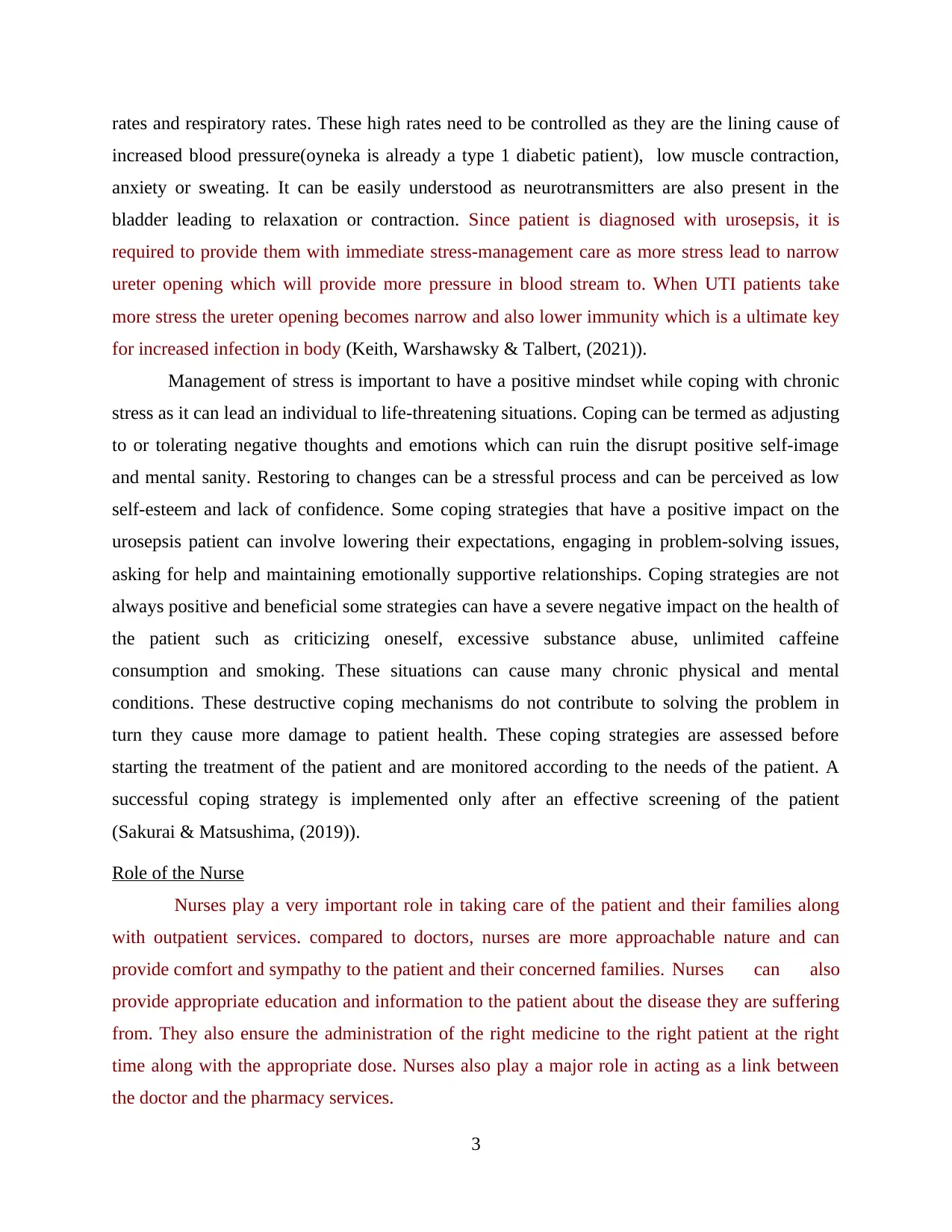
rates and respiratory rates. These high rates need to be controlled as they are the lining cause of
increased blood pressure(oyneka is already a type 1 diabetic patient), low muscle contraction,
anxiety or sweating. It can be easily understood as neurotransmitters are also present in the
bladder leading to relaxation or contraction. Since patient is diagnosed with urosepsis, it is
required to provide them with immediate stress-management care as more stress lead to narrow
ureter opening which will provide more pressure in blood stream to. When UTI patients take
more stress the ureter opening becomes narrow and also lower immunity which is a ultimate key
for increased infection in body (Keith, Warshawsky & Talbert, (2021)).
Management of stress is important to have a positive mindset while coping with chronic
stress as it can lead an individual to life-threatening situations. Coping can be termed as adjusting
to or tolerating negative thoughts and emotions which can ruin the disrupt positive self-image
and mental sanity. Restoring to changes can be a stressful process and can be perceived as low
self-esteem and lack of confidence. Some coping strategies that have a positive impact on the
urosepsis patient can involve lowering their expectations, engaging in problem-solving issues,
asking for help and maintaining emotionally supportive relationships. Coping strategies are not
always positive and beneficial some strategies can have a severe negative impact on the health of
the patient such as criticizing oneself, excessive substance abuse, unlimited caffeine
consumption and smoking. These situations can cause many chronic physical and mental
conditions. These destructive coping mechanisms do not contribute to solving the problem in
turn they cause more damage to patient health. These coping strategies are assessed before
starting the treatment of the patient and are monitored according to the needs of the patient. A
successful coping strategy is implemented only after an effective screening of the patient
(Sakurai & Matsushima, (2019)).
Role of the Nurse
Nurses play a very important role in taking care of the patient and their families along
with outpatient services. compared to doctors, nurses are more approachable nature and can
provide comfort and sympathy to the patient and their concerned families. Nurses can also
provide appropriate education and information to the patient about the disease they are suffering
from. They also ensure the administration of the right medicine to the right patient at the right
time along with the appropriate dose. Nurses also play a major role in acting as a link between
the doctor and the pharmacy services.
3
increased blood pressure(oyneka is already a type 1 diabetic patient), low muscle contraction,
anxiety or sweating. It can be easily understood as neurotransmitters are also present in the
bladder leading to relaxation or contraction. Since patient is diagnosed with urosepsis, it is
required to provide them with immediate stress-management care as more stress lead to narrow
ureter opening which will provide more pressure in blood stream to. When UTI patients take
more stress the ureter opening becomes narrow and also lower immunity which is a ultimate key
for increased infection in body (Keith, Warshawsky & Talbert, (2021)).
Management of stress is important to have a positive mindset while coping with chronic
stress as it can lead an individual to life-threatening situations. Coping can be termed as adjusting
to or tolerating negative thoughts and emotions which can ruin the disrupt positive self-image
and mental sanity. Restoring to changes can be a stressful process and can be perceived as low
self-esteem and lack of confidence. Some coping strategies that have a positive impact on the
urosepsis patient can involve lowering their expectations, engaging in problem-solving issues,
asking for help and maintaining emotionally supportive relationships. Coping strategies are not
always positive and beneficial some strategies can have a severe negative impact on the health of
the patient such as criticizing oneself, excessive substance abuse, unlimited caffeine
consumption and smoking. These situations can cause many chronic physical and mental
conditions. These destructive coping mechanisms do not contribute to solving the problem in
turn they cause more damage to patient health. These coping strategies are assessed before
starting the treatment of the patient and are monitored according to the needs of the patient. A
successful coping strategy is implemented only after an effective screening of the patient
(Sakurai & Matsushima, (2019)).
Role of the Nurse
Nurses play a very important role in taking care of the patient and their families along
with outpatient services. compared to doctors, nurses are more approachable nature and can
provide comfort and sympathy to the patient and their concerned families. Nurses can also
provide appropriate education and information to the patient about the disease they are suffering
from. They also ensure the administration of the right medicine to the right patient at the right
time along with the appropriate dose. Nurses also play a major role in acting as a link between
the doctor and the pharmacy services.
3
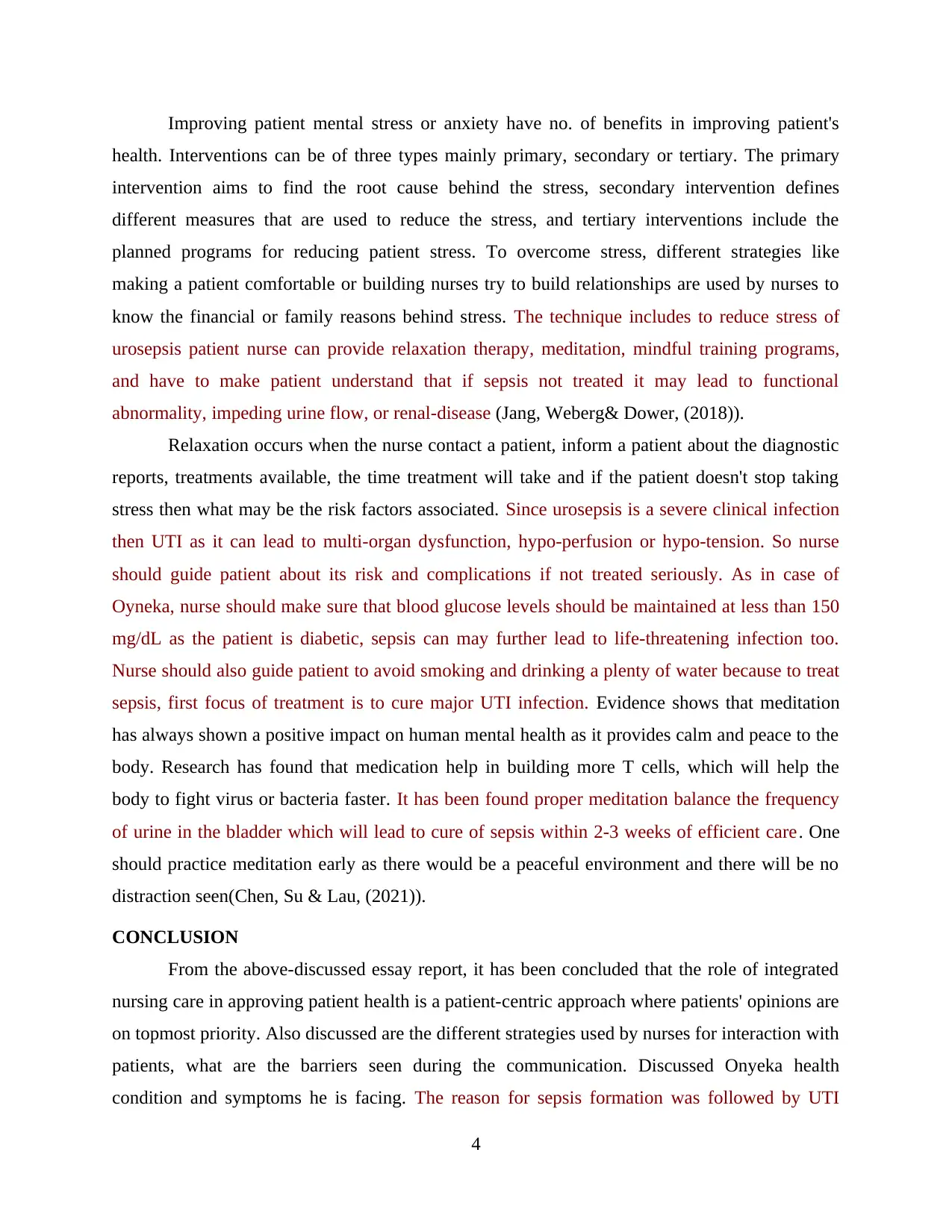
Improving patient mental stress or anxiety have no. of benefits in improving patient's
health. Interventions can be of three types mainly primary, secondary or tertiary. The primary
intervention aims to find the root cause behind the stress, secondary intervention defines
different measures that are used to reduce the stress, and tertiary interventions include the
planned programs for reducing patient stress. To overcome stress, different strategies like
making a patient comfortable or building nurses try to build relationships are used by nurses to
know the financial or family reasons behind stress. The technique includes to reduce stress of
urosepsis patient nurse can provide relaxation therapy, meditation, mindful training programs,
and have to make patient understand that if sepsis not treated it may lead to functional
abnormality, impeding urine flow, or renal-disease (Jang, Weberg& Dower, (2018)).
Relaxation occurs when the nurse contact a patient, inform a patient about the diagnostic
reports, treatments available, the time treatment will take and if the patient doesn't stop taking
stress then what may be the risk factors associated. Since urosepsis is a severe clinical infection
then UTI as it can lead to multi-organ dysfunction, hypo-perfusion or hypo-tension. So nurse
should guide patient about its risk and complications if not treated seriously. As in case of
Oyneka, nurse should make sure that blood glucose levels should be maintained at less than 150
mg/dL as the patient is diabetic, sepsis can may further lead to life-threatening infection too.
Nurse should also guide patient to avoid smoking and drinking a plenty of water because to treat
sepsis, first focus of treatment is to cure major UTI infection. Evidence shows that meditation
has always shown a positive impact on human mental health as it provides calm and peace to the
body. Research has found that medication help in building more T cells, which will help the
body to fight virus or bacteria faster. It has been found proper meditation balance the frequency
of urine in the bladder which will lead to cure of sepsis within 2-3 weeks of efficient care. One
should practice meditation early as there would be a peaceful environment and there will be no
distraction seen(Chen, Su & Lau, (2021)).
CONCLUSION
From the above-discussed essay report, it has been concluded that the role of integrated
nursing care in approving patient health is a patient-centric approach where patients' opinions are
on topmost priority. Also discussed are the different strategies used by nurses for interaction with
patients, what are the barriers seen during the communication. Discussed Onyeka health
condition and symptoms he is facing. The reason for sepsis formation was followed by UTI
4
health. Interventions can be of three types mainly primary, secondary or tertiary. The primary
intervention aims to find the root cause behind the stress, secondary intervention defines
different measures that are used to reduce the stress, and tertiary interventions include the
planned programs for reducing patient stress. To overcome stress, different strategies like
making a patient comfortable or building nurses try to build relationships are used by nurses to
know the financial or family reasons behind stress. The technique includes to reduce stress of
urosepsis patient nurse can provide relaxation therapy, meditation, mindful training programs,
and have to make patient understand that if sepsis not treated it may lead to functional
abnormality, impeding urine flow, or renal-disease (Jang, Weberg& Dower, (2018)).
Relaxation occurs when the nurse contact a patient, inform a patient about the diagnostic
reports, treatments available, the time treatment will take and if the patient doesn't stop taking
stress then what may be the risk factors associated. Since urosepsis is a severe clinical infection
then UTI as it can lead to multi-organ dysfunction, hypo-perfusion or hypo-tension. So nurse
should guide patient about its risk and complications if not treated seriously. As in case of
Oyneka, nurse should make sure that blood glucose levels should be maintained at less than 150
mg/dL as the patient is diabetic, sepsis can may further lead to life-threatening infection too.
Nurse should also guide patient to avoid smoking and drinking a plenty of water because to treat
sepsis, first focus of treatment is to cure major UTI infection. Evidence shows that meditation
has always shown a positive impact on human mental health as it provides calm and peace to the
body. Research has found that medication help in building more T cells, which will help the
body to fight virus or bacteria faster. It has been found proper meditation balance the frequency
of urine in the bladder which will lead to cure of sepsis within 2-3 weeks of efficient care. One
should practice meditation early as there would be a peaceful environment and there will be no
distraction seen(Chen, Su & Lau, (2021)).
CONCLUSION
From the above-discussed essay report, it has been concluded that the role of integrated
nursing care in approving patient health is a patient-centric approach where patients' opinions are
on topmost priority. Also discussed are the different strategies used by nurses for interaction with
patients, what are the barriers seen during the communication. Discussed Onyeka health
condition and symptoms he is facing. The reason for sepsis formation was followed by UTI
4
⊘ This is a preview!⊘
Do you want full access?
Subscribe today to unlock all pages.

Trusted by 1+ million students worldwide
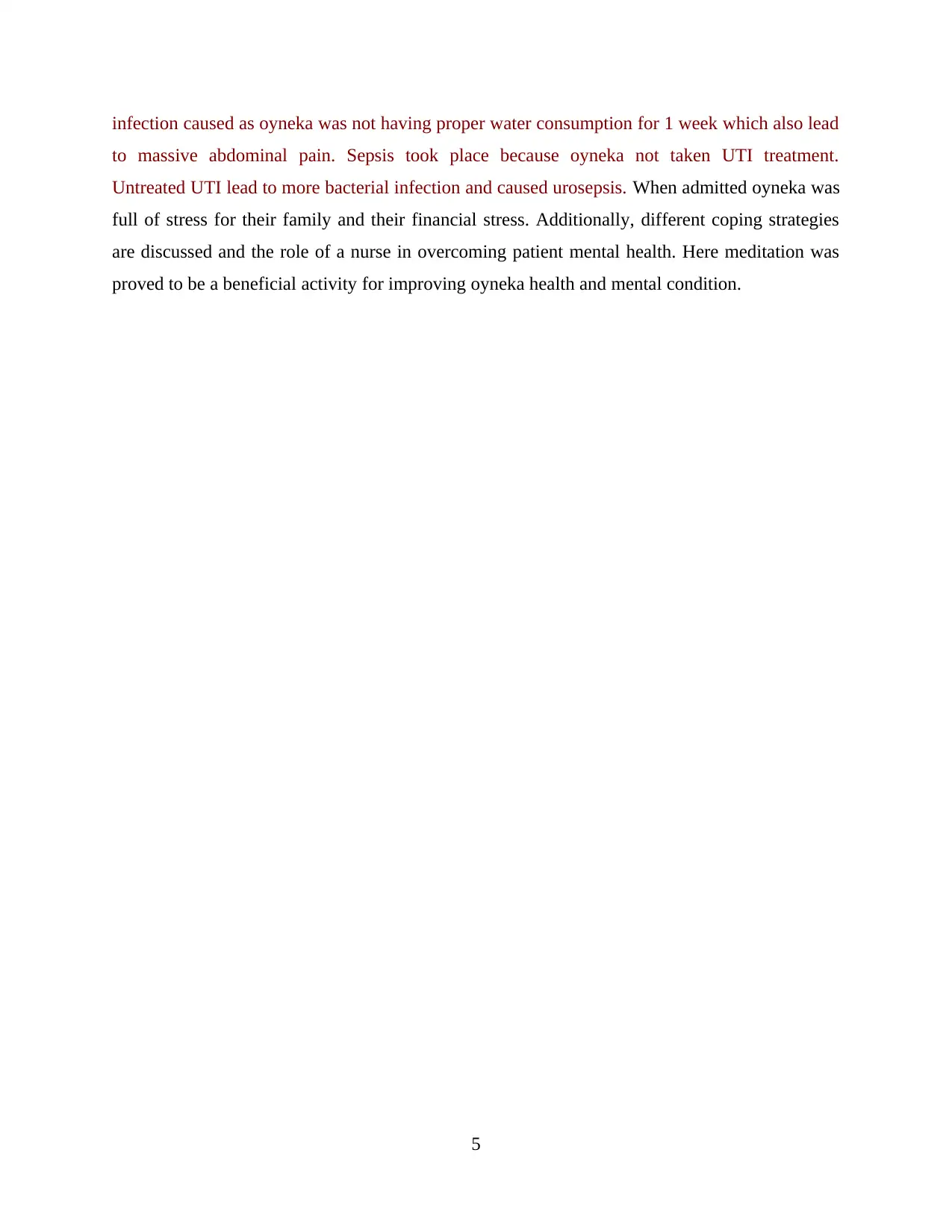
infection caused as oyneka was not having proper water consumption for 1 week which also lead
to massive abdominal pain. Sepsis took place because oyneka not taken UTI treatment.
Untreated UTI lead to more bacterial infection and caused urosepsis. When admitted oyneka was
full of stress for their family and their financial stress. Additionally, different coping strategies
are discussed and the role of a nurse in overcoming patient mental health. Here meditation was
proved to be a beneficial activity for improving oyneka health and mental condition.
5
to massive abdominal pain. Sepsis took place because oyneka not taken UTI treatment.
Untreated UTI lead to more bacterial infection and caused urosepsis. When admitted oyneka was
full of stress for their family and their financial stress. Additionally, different coping strategies
are discussed and the role of a nurse in overcoming patient mental health. Here meditation was
proved to be a beneficial activity for improving oyneka health and mental condition.
5
Paraphrase This Document
Need a fresh take? Get an instant paraphrase of this document with our AI Paraphraser
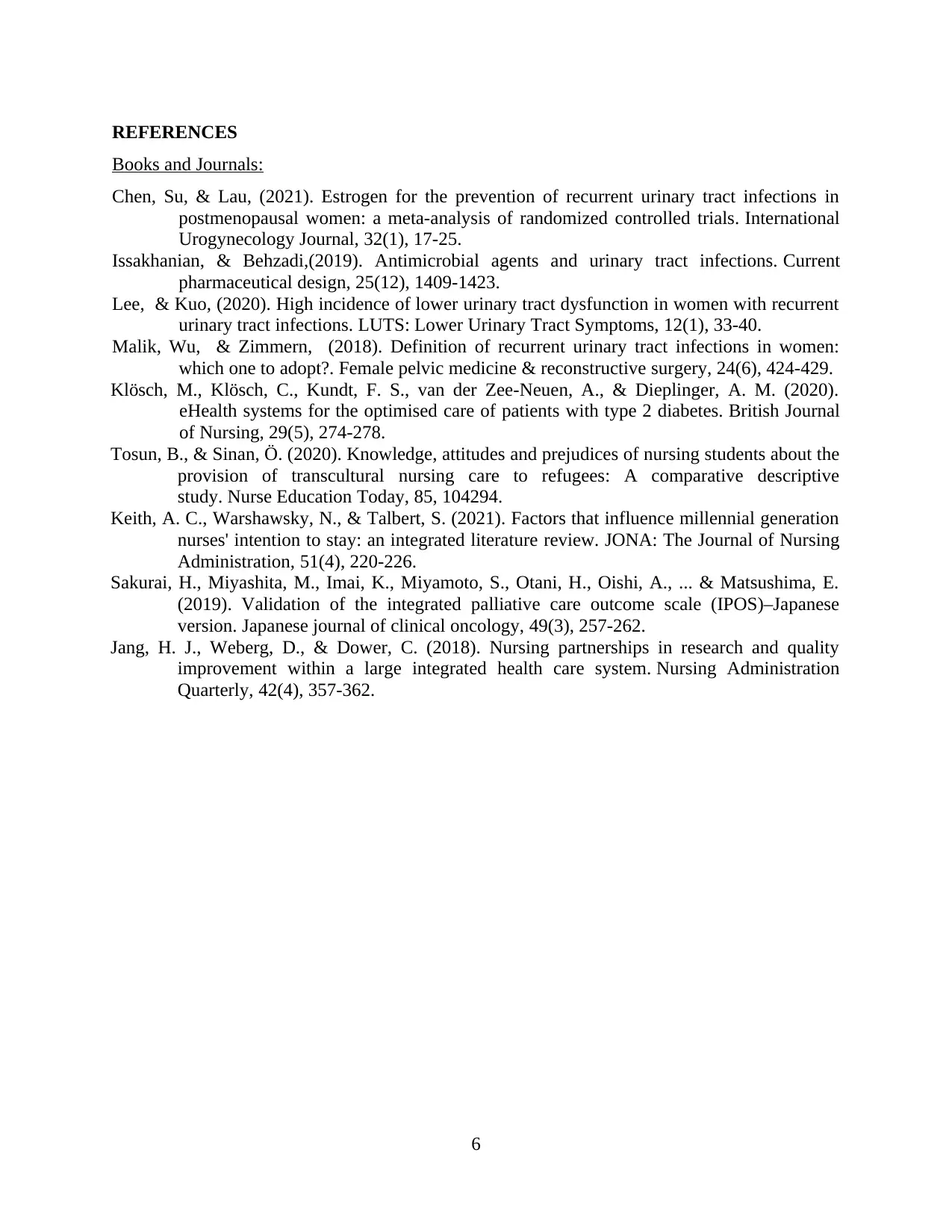
REFERENCES
Books and Journals:
Chen, Su, & Lau, (2021). Estrogen for the prevention of recurrent urinary tract infections in
postmenopausal women: a meta-analysis of randomized controlled trials. International
Urogynecology Journal, 32(1), 17-25.
Issakhanian, & Behzadi,(2019). Antimicrobial agents and urinary tract infections. Current
pharmaceutical design, 25(12), 1409-1423.
Lee, & Kuo, (2020). High incidence of lower urinary tract dysfunction in women with recurrent
urinary tract infections. LUTS: Lower Urinary Tract Symptoms, 12(1), 33-40.
Malik, Wu, & Zimmern, (2018). Definition of recurrent urinary tract infections in women:
which one to adopt?. Female pelvic medicine & reconstructive surgery, 24(6), 424-429.
Klösch, M., Klösch, C., Kundt, F. S., van der Zee-Neuen, A., & Dieplinger, A. M. (2020).
eHealth systems for the optimised care of patients with type 2 diabetes. British Journal
of Nursing, 29(5), 274-278.
Tosun, B., & Sinan, Ö. (2020). Knowledge, attitudes and prejudices of nursing students about the
provision of transcultural nursing care to refugees: A comparative descriptive
study. Nurse Education Today, 85, 104294.
Keith, A. C., Warshawsky, N., & Talbert, S. (2021). Factors that influence millennial generation
nurses' intention to stay: an integrated literature review. JONA: The Journal of Nursing
Administration, 51(4), 220-226.
Sakurai, H., Miyashita, M., Imai, K., Miyamoto, S., Otani, H., Oishi, A., ... & Matsushima, E.
(2019). Validation of the integrated palliative care outcome scale (IPOS)–Japanese
version. Japanese journal of clinical oncology, 49(3), 257-262.
Jang, H. J., Weberg, D., & Dower, C. (2018). Nursing partnerships in research and quality
improvement within a large integrated health care system. Nursing Administration
Quarterly, 42(4), 357-362.
6
Books and Journals:
Chen, Su, & Lau, (2021). Estrogen for the prevention of recurrent urinary tract infections in
postmenopausal women: a meta-analysis of randomized controlled trials. International
Urogynecology Journal, 32(1), 17-25.
Issakhanian, & Behzadi,(2019). Antimicrobial agents and urinary tract infections. Current
pharmaceutical design, 25(12), 1409-1423.
Lee, & Kuo, (2020). High incidence of lower urinary tract dysfunction in women with recurrent
urinary tract infections. LUTS: Lower Urinary Tract Symptoms, 12(1), 33-40.
Malik, Wu, & Zimmern, (2018). Definition of recurrent urinary tract infections in women:
which one to adopt?. Female pelvic medicine & reconstructive surgery, 24(6), 424-429.
Klösch, M., Klösch, C., Kundt, F. S., van der Zee-Neuen, A., & Dieplinger, A. M. (2020).
eHealth systems for the optimised care of patients with type 2 diabetes. British Journal
of Nursing, 29(5), 274-278.
Tosun, B., & Sinan, Ö. (2020). Knowledge, attitudes and prejudices of nursing students about the
provision of transcultural nursing care to refugees: A comparative descriptive
study. Nurse Education Today, 85, 104294.
Keith, A. C., Warshawsky, N., & Talbert, S. (2021). Factors that influence millennial generation
nurses' intention to stay: an integrated literature review. JONA: The Journal of Nursing
Administration, 51(4), 220-226.
Sakurai, H., Miyashita, M., Imai, K., Miyamoto, S., Otani, H., Oishi, A., ... & Matsushima, E.
(2019). Validation of the integrated palliative care outcome scale (IPOS)–Japanese
version. Japanese journal of clinical oncology, 49(3), 257-262.
Jang, H. J., Weberg, D., & Dower, C. (2018). Nursing partnerships in research and quality
improvement within a large integrated health care system. Nursing Administration
Quarterly, 42(4), 357-362.
6
1 out of 8
Related Documents
Your All-in-One AI-Powered Toolkit for Academic Success.
+13062052269
info@desklib.com
Available 24*7 on WhatsApp / Email
![[object Object]](/_next/static/media/star-bottom.7253800d.svg)
Unlock your academic potential
Copyright © 2020–2025 A2Z Services. All Rights Reserved. Developed and managed by ZUCOL.





